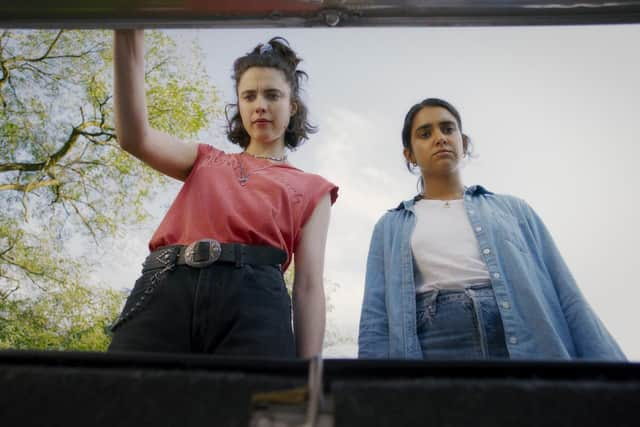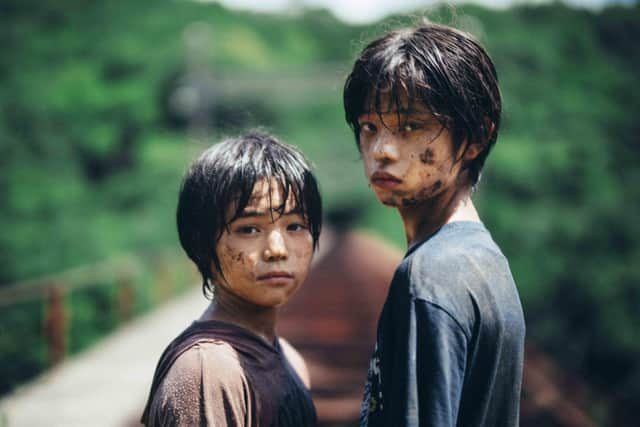Film reviews: Drive-Away Dolls | Monster | Janey | Showing Up
Drive-Away Dolls (15) ***
Monster (12A) ****
Janey (18) ***
Showing Up (12) ****
Plenty of filmmakers have plundered the Coen brothers for inspiration over the years, so it’s perhaps churlish to criticise Ethan Coen for homaging his own work in Drive-Away Dolls. Co-written by Coen and his wife Tricia Cooke, his first narrative feature as a solo director is an entertainingly wacky throwback to the glory days of Raising Arizona and Fargo, albeit scrappier and baggier and infused with some of the try-hard insanity of more laboured Coen brothers’ comedies like Burn After Reading.
Set in 1999, it revolves around Jamie (Margaret Qualley) and Marian (Geraldine Viswanathan), lesbian best friends who embark on a spontaneous road trip to visit the straight-laced Marian’s aunt after the promiscuous and free-spirited Jamie breaks up with her vindictive cop girlfriend (Beanie Feldstein). To save money, they sign up for a drive-away service that recruits people to transport vehicles from city to city on behalf of their owners. As luck would have it, though, they’re given a car with a payload intended for someone else and they soon find themselves involved in a bizarre political cover-up going back the Flower Power days of the 1960s.
Advertisement
Hide AdIntercut with psychedelic flashbacks, social etiquette-obsessed hitmen, amusingly frank sex scenes and moments of over-the-top violence, the film cuts loose in ways that are sometimes funny, sometimes not. Yet in Qualley, Viswanathan and Feldstein it’s blessed with a trio of up-for-anything performers who can deliver Coen and Cooke’s ribald rat-a-tat dialogue with noir-ish aplomb and make the queer relationships at the heart of the film earthy and endearing. There are lively supporting turns too from Colman Domingo and Matt Damon, the latter proving there are no small parts with a slyly extended last-act cameo.


In Monster, prolific Japanese auteur Hirokazu Kore-eda applies the multi-perspective structure of Rashomon so deftly to this family drama about a single mother, her troubled son and a teacher accused of assault that its cumulative power almost comes as a surprise – until you remember that this is the director of Shoplifters and Our Little Sister and compassion and empathy flow through his work like air.
It takes shape initially around Shoplifters star Sakura Ando, here playing Saori, a young widow embroiled in a protracted battle with the jobsworth staff of her child’s school in an effort to uncover the truth about the bruises her increasingly moody ten-year-old son Minato (Soya Kurokawa) has come home with. The passive aggressive bureaucracy she encounters is so absurdly legalistic it’s hard not to be enraged on her behalf, but both Minato’s behaviour and that of his teacher, Mr Hori (Eita Nagayama), is so strange that it’s also clear all is not what it seems.
Using the visual language of disaster movies as a recurring motif (a fire and a typhoon feature prominently), the film begins with a towering inferno to which Kore-eda returns twice more as he restarts the film from the point of view of Mr Hori then Minato, each time subtly broadening our understanding of the emotional forces that seem to be combining to create this perfect storm of disaffection. Although the monster of the title is never explicitly revealed, mistrust, shame, dishonesty and cruelty repeatedly function like tentacles, reaching into the lives of the characters and threatening to drag them down into an abyss of their own making. But Kore-eda’s not one for despair; love and compassion, however instinctively understood, remain a lifeline.
On limited release after closing Glasgow Film Festival last weekend, Janey follows veteran Glaswegian comedian Janey Godley on her Not Dead Yet tour as she balances the demands of performing with her battle against terminal cancer. A stand-up confronting her own mortality is a naturally compelling hook for a biographical documentary and director John Archer makes the most of Godley’s willingness to reflect on the trauma and hardship that has shaped her life as she takes her grown-up daughter, Ashley Storrie, on a personal tour of some pretty painful haunts. A stand-up herself, Storrie is Godley’s support act onstage and off and the film benefits hugely from the intimacy her presence and probing questions elicit. In between there’s archival footage of Godley’s early gigs and TV appearances and, of course, her infamous protests against Donald Trump, as well as the parodies of Nicola Sturgeon’s daily Covid briefings that turned her into a viral sensation in Scotland during the pandemic. In the manner of a lot of recent celebrity docs promising somewhat candid portraits of their subjects, Janey also affords Godley the opportunity to take control of the Twitter controversy that led to her cancellation. Mostly, though, this is a very watchable celebration of her indomitable spirit and ability to laugh at life.


A movie about artists doing the work of artists, Kelly Reichardt’s Showing Up is as finely wrought as the figurines its protagonist spends most of the film trying to complete. Which is to say, it’s delicate and unassuming, and when it eventually comes together, it packs a subtle emotional punch – the way art you sometimes can’t explain often does. Michelle Williams takes the lead as Lizzy, a part-time sculptor whose meticulous preparations for an upcoming show are upended in small ways by her demanding family, her friends and an injured pigeon she’s taken in. Working with Williams for the fourth time, Reichardt shapes this mundane-seeming material into a wonderfully low-key film about the value of caring in world that mythologises and celebrates the carefree.
All films are on general release from 15 March